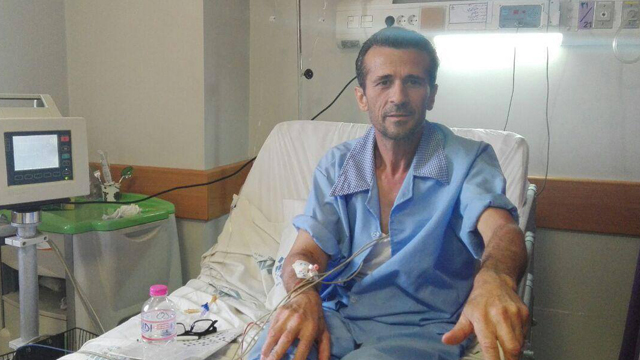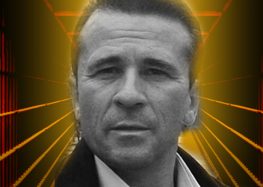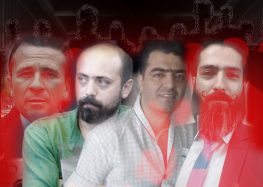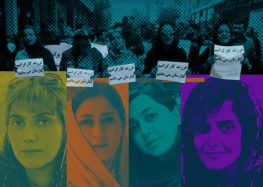Labor Rights Activist in Critical Condition After 50-Day Hunger Strike
 Prominent leftist scholar Noam Chomsky has called for Jafar Azimzadeh’s release
Prominent leftist scholar Noam Chomsky has called for Jafar Azimzadeh’s release
Labor rights activist Jafar Azimzadeh is in critical condition in Evin Prison after enduring a wet hunger strike for more than 50 days, his wife, Akram Rahimpour, told the International Campaign for Human Rights in Iran.
“I’m worried about him. His vision and hearing have become impaired and he can’t recognize the voices of his close friends on the phone. He can’t keep his balance when he walks. He has problems urinating. There’s bleeding in his intestines. He has bladder and kidney pains. He feels dizzy more often than before,” she said. “Last week he lost consciousness several times. On Monday (June 20, 2016) his body was very cold and he said the left side of his body was going numb.”
Azimzadeh, the president of the Free Workers Union of Iran, began his hunger strike on April 29, 2016 to protest being sentenced to prison on national security grounds even though he has only participated in peaceful campaigns for improved workers’ rights.
“Remove the charge of ‘assembly and collusion against national security’ and other security charges from my case and those of other labor activists and teachers,” said Azimzadeh, who is being held in Evin Prison’s Ward 8, in an open letter to Deputy Labor Minister Hassan Hefdahtan on June 17, 2016.
“In the three-year lifespan of the [Hassan] Rouhani administration, the majority of the most effective independent labor activists and teachers have been prosecuted under national security laws and given long prison sentences,” added Azimzadeh. “Most of these individuals were arrested by the Intelligence Ministry under the current government and all of them were charged with ‘assembly and collusion against national security’ and faced maximum penalties in the Revolutionary Court.”
Rahimpour said the authorities had so far refused to look into her husband’s demands but had pledged to release him for a few days on furlough (temporary leave) if he ended his hunger strike.
Azimzadeh was arrested for helping coordinate the collection of 30,000 signatures from workers in support of a list of demands including the formation of the Free Workers Union of Iran and the Union of Expelled and Unemployed Workers, as well as for organizing labor protests and speaking to foreign media outlets.
Independent unions are not allowed to function in Iran, workers are routinely fired and risk arrest for striking, and labor leaders are prosecuted under national security charges and sentenced to long prison terms.
International Support
On June 15, 2016 the prominent leftist American scholar and activist Noam Chomsky signed a letter along with more than 20 scholars, labor leaders and journalists from around the world calling for Azimzadeh’s immediate release.
“We are deeply concerned about the health and wellbeing of Jafar Azimzadeh and other jailed workers in Iran and call for their immediate and unconditional freedom,” said the letter. “The Iranian government is responsible for the life of Jafar Azimzadeh and other political prisoners. At the same time, we are sincerely urging Jafar Azimzadeh to end his hunger strike; the struggle for workers’ right is strengthened when the labor movement’s activists are alive and well.”
On May 30, 2016—the 32nd day of Azimzadeh’s hunger strike—a group of his friends, supporters and relatives gathered in front of Iran’s Parliament in Baharestan Square in Tehran to demand his release.
Rahimpour told the Campaign her husband’s hunger strike is adversely affecting their 10 and 12-year-old sons, who are deeply worried for their father’s safety.
Azimzadeh was arrested on April 30, 2014—a day before International Labor day, which is usually commemorated by labor rights activists and supporters with protests and demonstrations in Iran. He was freed on bail after being interrogated and held in solitary confinement for 46 days.
On March 1, 2015 Judge Abolqasem Salavati of Branch 15 of the Revolutionary Court sentenced Azimzadeh to six years in prison for “assembly and collusion against national security” and “propaganda against the state.” The Appeals Court upheld the sentence and the labor activist surrendered himself to Evin Prison on November 8, 2015.






